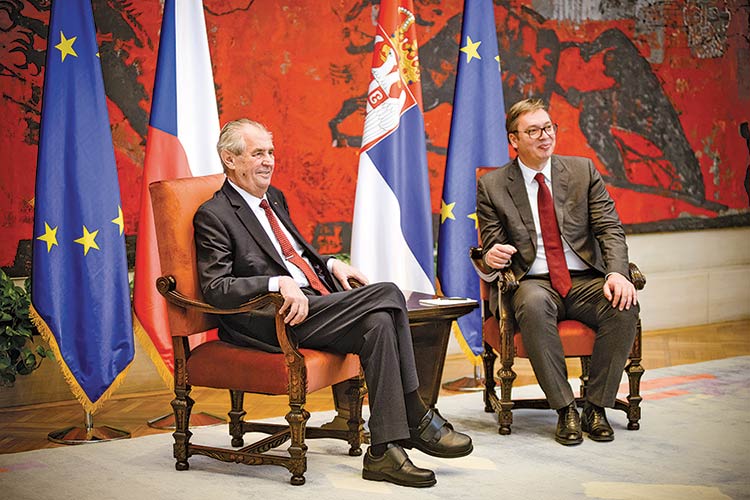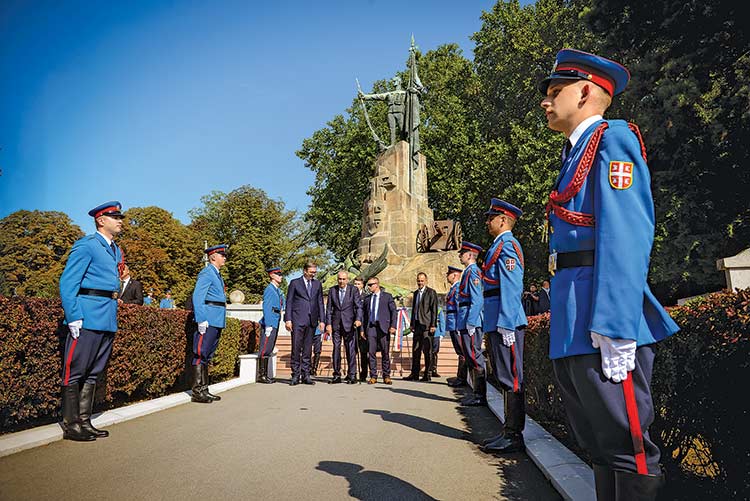For my many years in politics, I am known as a person who is consistent in his opinions. I still consider the recognition of an independent Kosovo to be a mistake, and as I mentioned in Belgrade in September 2019, I discussed this issue with the highest constitutional officials in my country. However, they do not share my opinion and, since we live in a democracy, I have to respect their majority opinion – Miloš Zeman
Many years of excellent bilateral relations and strengthening cooperation, particularly in the domain of the economy, are the main topics of the latest meeting between the presidents of the Czech Republic and the Republic of Serbia. President Miloš Zeman was in Belgrade two years ago, while this year he is hosting President Aleksandar Vučić in Prague. In this interview for CorD Magazine, the President of the Czech Republic says that the uniqueness of relations between the two countries can be illustrated by the fact that the visit of the President of Serbia will be “the first official presidential visit since the outbreak of the COVID-19 pandemic”.
Zeman says that he still believes EU enlargement is essential, including Serbia’s accession, because “membership consequently leads to peace, stability and prosperity”. The Czech president says that, in conversation with his guest from Belgrade, he will also inquire about the vaccination process in Serbia. In response to CorD’s question about the criteria that forms the basis for the Czech Republic to choose where it will source vaccines, President Zeman says that the fight against the pandemic is a question of health and not geopolitics.
President Zeman, on the basis of your invitation, the visit of Serbian President Aleksandar Vučić to Czechia has been announced. What will the main topics of conversation be during the visit?
I am very glad that my friend, Serbian President Aleksandar Vučić, has accepted my invitation to Prague. It is a great honour for me to be able to repay his hospitality from my visit to Belgrade in September 2019. Among the main topics of our discussion will be the excellent long-term bilateral relations with an emphasis on economic ties and support for mutual investments. Of course, we will touch on the issue of the global coronavirus pandemic. In this context, I would like to hear the Serbian experience with its successful vaccination programme. The next item on the agenda will be the issue of further EU enlargement and the related situation in the Western Balkan region.
Further enlargement of the EU must not fall victim to these challenges, but should continue. I am sure that the Czech Republic will play an active role in this and we are ready to continue to assist Serbia in its transformation process
How would you assess current bilateral relations between our two countries?
We have long-term excellent bilateral relations with Serbia, which have their historical roots. The frequency of our meetings with President Vučić, together with the fact that his visit to Prague is the first official presidential visit since the outbreak of the pandemic, demonstrate the uniqueness of our relations. I am also very pleased with the intensity of mutual economic relations and the growing interest of Czech companies in investing in your country.
The Czech Republic is committed to accelerating the pace of the EU enlargement process. However, given your experience, do you consider further enlargement as even being on the EU agenda, if we take into consideration all the challenges that the Union is facing?
The Czech Republic is carefully preparing for the second half of 2022, when it will again take over the presidency of the EU Council. EU enlargement will be high on the agenda of our Presidency. The Czech Republic has always supported further enlargement of the Union, because we believe that membership consequently leads to peace, stability and prosperity.

You are right that the EU is currently busy with many challenges, especially the effects of the pandemic. However, further enlargement of the EU must not fall victim to these challenges, but should continue. I am sure that the Czech Republic will play an active role in this and we are ready to continue to assist Serbia in its transformation process
What do you think of the initiative to strengthen cooperation with non-EU member states like Serbia through the V4+ platform?
I have long been a supporter of strengthening the V4+ format. V4 has an important regional dimension and I am very pleased that it is active through the International Visegrad Fund in Serbia, among others. Through V4, we can share our experience with the transformative process of joining the EU. The participation of President Vučić in the V4 summit in the Czech Republic in October 2019 was also confirmation of the excellent cooperation between the V4 and Serbia. During that meeting, the V4 as a whole supported the integration of Serbia into the EU.
V4 has an important regional dimension and I am very pleased that it is active through the International Visegrad Fund in Serbia, among others. Through V4, we can share our experience with the transformative process of joining the EU
How would you comment on the EU’s response to the COVID-19 crisis from the perspective of your country?
No one in the world, including the EU, was ready for a pandemic of this magnitude. A pandemic knows no borders. I think everyone was initially surprised by its speed and intensity. In this context, the rate at which vaccines were prepared should be appreciated. The vaccines are the lights at the end of the tunnel. However, it should be noted that the EU could be faster in authorising vaccines for its own market. Serbia is one of the leaders in vaccination in Europe, also due to the fact that it is able to vaccinate with, for example, Russian or Chinese vaccines.
There is an impression that a division was created between West and East within the EU in the response to the crisis, especially in terms of the distribution of vaccines. Do you think there are grounds for such an opinion?
I do not consider the mentioned opinion justified. On the contrary, I welcome the centralisation of vaccine purchases by the European Commission, which represents a very large market and thus has better negotiating conditions than individual countries. Thanks to this, the European Commission was able to negotiate very favourable prices for vaccines.
Individual countries had a choice of how many vaccines and from which manufacturer they would like to order. However, the subsequent complications with distribution are more due to the huge demand and insufficient production capacity of individual companies. This is gradually improving and thus I believe that the pandemic will soon be over.

When it comes to vaccine procurement, there is an issue over whether this is a healthcare matter or a geopolitical one?
The issue of vaccines is purely a matter of saving lives and should not be linked in any way to geopolitics. If you ask a person if he wants to risk the fight for life in an intensive care unit connected to a ventilator or if he wants to be spared from this experience with the help of a Russian or Chinese vaccine, then his or her answer will be clear. I find it very unfortunate when this issue is linked to geopolitics. As I mentioned earlier, a pandemic knows no borders and we should unite to fight it.
How would you explain your government’s reluctance to procure Russian vaccines?
Let me reiterate that the issue of vaccines is primarily a matter of saving lives, and that is how it should be approached. The Russian Sputnik V vaccine is currently being evaluated as part of the approval process at the European Medicines Agency. If it is approved, I believe that our government will allow the use of the vaccine in the Czech Republic. According to the available information, it is a very high-quality vaccine and there are quite a few countries in the EU that would like to use it and produce it.
I was informed by the Minister of the Interior about the activities of 18 Russian intelligence officers with diplomatic cover at the Russian Embassy in Prague. To be honest, I don’t like intelligence officers in general, they do more harm than good
April saw Greece open its borders to Serbian citizens who’ve been vaccinated, regardless of which vaccine they’ve received. Would you support an initiative for Czechia to do the same?
Of course I would support this initiative in the Czech Republic. I know that some form of vaccination passport is currently being discussed at the EU level, so let us wait for their results. I hope it will include all the available vaccines.
You are known on the European and Czech political scene as an opponent of Kosovo independence. You announced on the occasion of your 2019 visit to Belgrade that you would ask the constitutional authorities of the Czech Republic about the possibility of withdrawing recognition. What is your stance on this issue today?
For my many years in politics, I am known as a person who is consistent in his opinions. I still consider the recognition of an independent Kosovo to be a mistake, and as I mentioned in Belgrade in September 2019, I discussed this issue with the highest constitutional officials in my country. However, they do not share my opinion and, since we live in a democracy, I have to respect their majority opinion.
What was behind the expelling of Russian diplomats from Prague last April, which the Government also received your support to do?
Following the ongoing investigation into the explosion at the ammunition depot in Vrbětice in 2014 and the possible involvement of Russian military intelligence (GRU), I was informed by the Minister of the Interior about the activities of 18 Russian intelligence officers with diplomatic cover at the Russian Embassy in Prague. To be honest, I don’t like intelligence officers in general, they do more harm than good. I also don’t understand why intelligence officers should be crowded at the Russian Embassy, when we certainly need more experts on economic, cultural and other cooperation.
| VISIT Among the main topics of our discussion will be the excellent long-term bilateral relations with an emphasis on economic ties and support for mutual investments | ENLARGEMENT The Czech Republic has always supported further enlargement of the Union, because we believe that membership consequently leads to peace, stability and prosperity | CZECH-RUSSIAN ISSUES I don’t understand why intelligence officers should be crowded at the Russian Embassy, when we certainly need more experts on economic, cultural and other cooperation |
|---|